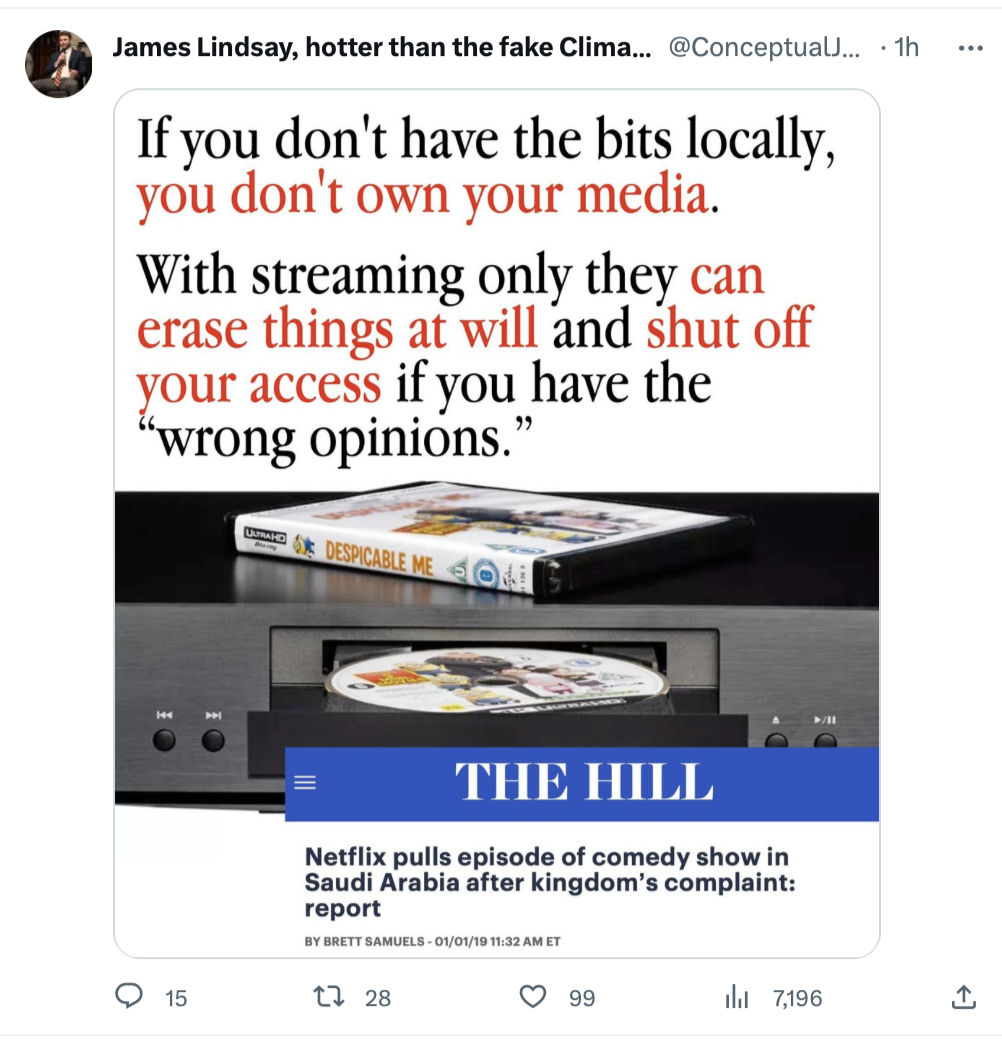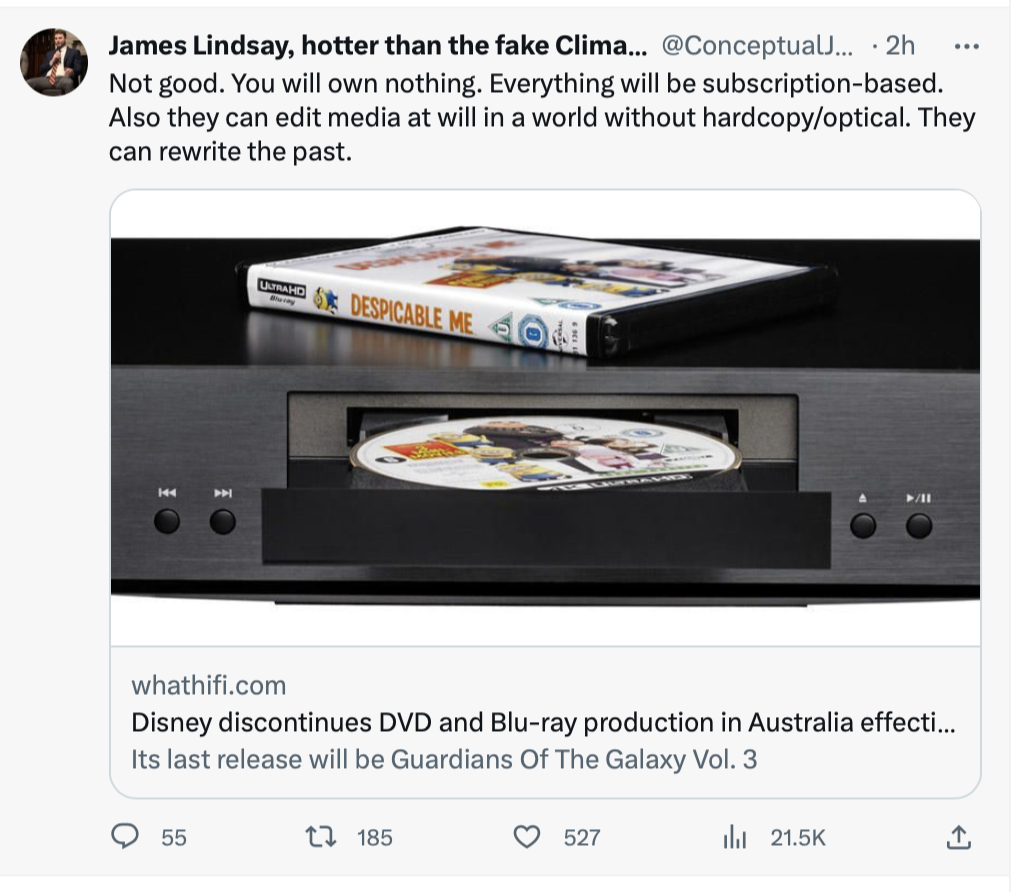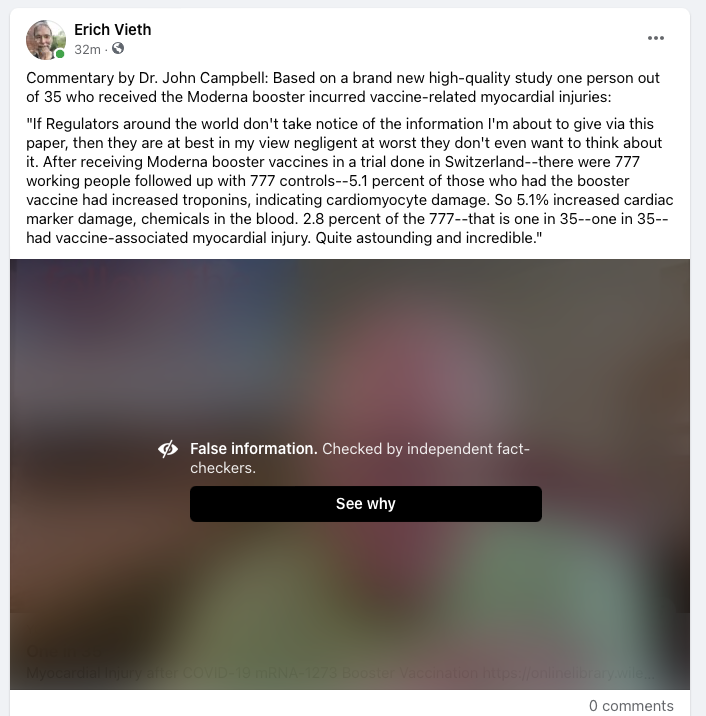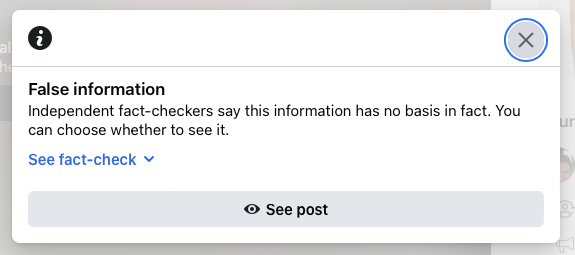No Need for Evidence When Enacting or Enforcing COVID Policy . . .
Each of these highly placed people forgot to mention what research they were relying on when they stated as fact that getting the vax would stop transmission.
Each of these highly placed people forgot to mention what research they were relying on when they stated as fact that getting the vax would stop transmission.
Do you have secure copies of your data? I do. James Lindsey has this warning.

 I create pdfs of my books and the Internet articles I value. Saving only the links is precarious. I buy my books in paper. It's for this reason. Too many things are disappearing these days. Things can disappear off the internet for innocent reasons too, of course. Sometimes, website are shut down for financial reasons or because the person maintaining the website doesn't want to maintain it. But way too many documents are becoming inconvenient to persons unknown in recent years and then they are no more . . .
I create pdfs of my books and the Internet articles I value. Saving only the links is precarious. I buy my books in paper. It's for this reason. Too many things are disappearing these days. Things can disappear off the internet for innocent reasons too, of course. Sometimes, website are shut down for financial reasons or because the person maintaining the website doesn't want to maintain it. But way too many documents are becoming inconvenient to persons unknown in recent years and then they are no more . . .
I was vaccinated twice and boosted once. I now regret receiving all of those shots, and it goes well beyond and rampant scientific and public health fraud being revealed, including the outrageous paper orchestrated by Anthony Fauci, “The Proximal Origin of SARS-CoV-2.” And see here and here. I'm not a scientist or a doctor, but I can see and hear and follow these discussions. We were told none of these things prior to being compelled to take these shots (except by Brett Weinstein, on a video that was pulled down by Youtube).
So here we now are. I am among a growing number of people concerned about the long-term hazards of these treatments, which were touted as "safe." Here are the most recent revelations. First, this discussion involving biologists Brett Weinstein and Heather Heying. The podcast focuses on commentary by Dr. John Campbell, an admission by Dr. Paul Offit and a new Swiss active-surveillance study: "Sex-specific differences in myocardial injury incidence after COVID-19 mRNA-1273 Booster Vaccination."
What do the Pfizer spokesmen not how ro say about the causal pathway from the "safe" vaccination it produced for COVID? They have no public answer. Rather than provide an answer, they purposefully and shamelessly obstruct and deflect:
Notice how they blatantly obstruct and deflect when they were asked for evidence that Pfizer vaccine decreases transmission of COVID from person to person. They simply don't give a shit about either safety or accuracy of public health pronouncements.
Back to the issue of myocarditis and pericarditis. First, some definitions.
Myocarditis: "Myocarditis is inflammation of the heart muscle (myocardium). The inflammation can reduce the heart's ability to pump blood. Myocarditis can cause chest pain, shortness of breath, and rapid or irregular heart rhythms (arrhythmias)."
Pericarditis: "Pericarditis is swelling and irritation of the thin, saclike tissue surrounding the heart (pericardium). Pericarditis often causes sharp chest pain. The chest pain occurs when the irritated layers of the pericardium rub against each other."
Commentary by Dr. John Campbell on the new study: Based on this brand new high-quality active surveillance study one person out of 35 who received the Moderna booster incurred vaccine-related heart injuries:
If Regulators around the world don't take notice of the information I'm about to give via this paper, then they are at best in my view negligent at worst they don't even want to think about it. After receiving Moderna booster vaccines in a trial done in Switzerland--there were 777 working people followed up with 777 controls--5.1 percent of those who had the booster vaccine had increased troponins, indicating cardiomyocyte damage. So 5.1% increased cardiac marker damage, chemicals in the blood. 2.8 percent of the 777--that is one in 35--one in 35--had vaccine-associated myocardial injury. Quite astounding and incredible.
This is the result of receiving the Moderna booster. Many of us received two shots prior to receiving the booster. Brett Weinstein and Heather Heying suggest that one who receives all three shots have even higher risk of sustaining heart damage--greater than 1 out of 35 and just because you don't experience short term damage does not mean that you are out of the woods. I was horrified to hear the entire podcast of Weinstein and Heying. If I know there was even a 1 out of 1,000 risk of sustaining heart damage by receiving one shot, I would have refused any of this "treatment." None of us were warned, however. This is the opposite of informed consent.
How many of the elite athletes collapsing (some of them severely injured or dead) were caused by the vaccines? Many people actively do not want to know and do not want to report any of this. What concerns me is that there seems to be a coordinated nonchalance about whether the COVID vaccines are causing the increase in cardiac arrests.
Here is the entire podcast featuring the discussion of Weinstein & Heying:
I posted the John Campbell video on FB with a quote by Campbell. Instead of allowing me to post it, here's what happened:

When you click the "See Why" button:

Who are these "Independent fact-checkers" who know so much more than Dr. John Campbell? Facebook does not disclose this. Are they former employees of the FBI or CIA or DHS? If so, are they consciously adhering to a narrative dictated by the U.S. Government? I'd like to know.
Nurse currently working in A and E with a demonstrated history in Nurse Education. Skilled in pratical Nursing, Healthcare, Nursing Research, and Health and Educational research. Strong healthcare services professional with two higher degrees and several teaching qualifications. Research record focused in teaching bioscience in national and international nurse education.
More about Campbell . . .Wikipedia as a source of propaganda? Just read the Wikipedia article titled "COVID-19 Lab Leak Theory." From the Wikipedia article, would think that there is no legitimate clashing version of this story.
Glenn Greenwald describes what has happened to Wikipedia in recent years, demonstrating by looking at various Wikipedia pages that demonstrate almost comedic bias. What kind of information is reliable according to Wikipedia? It is weighed heavily in favor of established corporate media sources. See Wikipedia: Reliable Sources. Consider further, this article: "Wikipedia: The Corrupt Encyclopedia: Wikipedia formally censors The Grayzone as regime-change advocates monopolize editing."
Larry Sangar, co-founder of Wikipedia, appeared on System Update to discuss his own concerns. According to Sangar, during the period of 2006-2012, Wikipedia became a biased pro-establishment website. He gave examples that he noticed from 2010-2015. Wikipedia became severely biased against Eastern/holoistic medical traditions. He sensed that it "got over the top" around 2013-2018, when Wikipedia increasingly moved onto the radar of the political establishment. Google began investing many millions of dollars in to Wikipedia. According to Sanger, "No encyclopedia has ever been as biased as Wikipedia is now."
Sanger mentioned that there are alternative encyclopedias, such as Ballotpedia, which he describes as "fairly neutral" and Conservapedia (on the conservative side). To read 35 encyclopedias at once, Sanger recommended using encyclosearch.org or encycloreader.org These sites us open source software, with digitally signed results. These are two attempts to try to strike a blow against censorship and control. Sanger also mentioned that there will soon be a Wordpress plugin that will allow people to aggregate their own website articles in a mega collection.
ELIZA MONDEGREEN argues that we could have avoided most of the pandemonium we are currently witnessing about transgenderism. His article is titled: "Trans Activism and the Road Not Taken: The current conflict over trans rights was entirely avoidable."
Here an excerpt from Mondegreen's article, along with Colin Wright's illustration:
A conversation about reasonable accommodations is a nuanced conversation. Instead, we got a radical trans movement that wants to erase sex in law and society, put men in women's prisons and boys in girls' sports, and run an unregulated medical experiment on gender-nonconforming children. This has given rise to an absurd and dystopian reality where men are granted access to women’s prisons, sports, and other protected spaces, and where gender-nonconforming children have become the target of unregulated medical experiments that involve puberty blocking drugs, cross-sex hormones, and extreme surgeries.